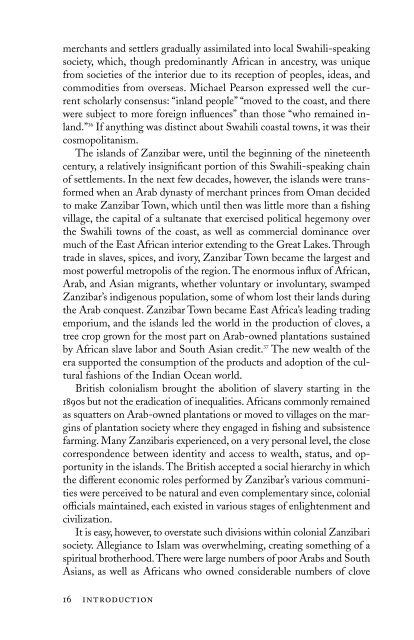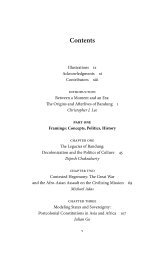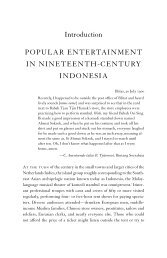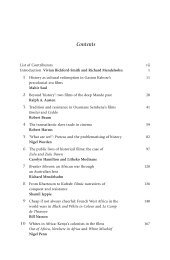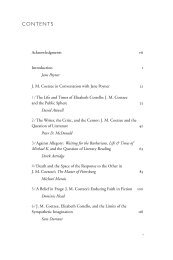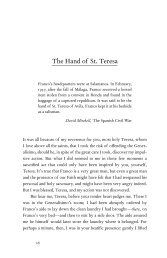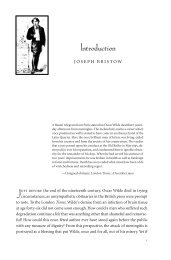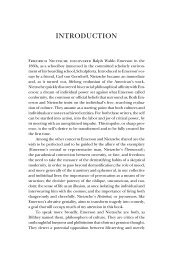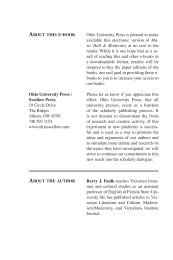Race, Revolution, and the Struggle for Human Rights in Zanzibar ...
Race, Revolution, and the Struggle for Human Rights in Zanzibar ...
Race, Revolution, and the Struggle for Human Rights in Zanzibar ...
Create successful ePaper yourself
Turn your PDF publications into a flip-book with our unique Google optimized e-Paper software.
merchants <strong>and</strong> settlers gradually assimilated <strong>in</strong>to local Swahili-speak<strong>in</strong>g<br />
society, which, though predom<strong>in</strong>antly African <strong>in</strong> ancestry, was unique<br />
from societies of <strong>the</strong> <strong>in</strong>terior due to its reception of peoples, ideas, <strong>and</strong><br />
commodities from overseas. Michael Pearson expressed well <strong>the</strong> current<br />
scholarly consensus: “<strong>in</strong>l<strong>and</strong> people” “moved to <strong>the</strong> coast, <strong>and</strong> <strong>the</strong>re<br />
were subject to more <strong>for</strong>eign <strong>in</strong>fluences” than those “who rema<strong>in</strong>ed <strong>in</strong>l<strong>and</strong>.”<br />
36 If anyth<strong>in</strong>g was dist<strong>in</strong>ct about Swahili coastal towns, it was <strong>the</strong>ir<br />
cosmopolitanism.<br />
The isl<strong>and</strong>s of <strong>Zanzibar</strong> were, until <strong>the</strong> beg<strong>in</strong>n<strong>in</strong>g of <strong>the</strong> n<strong>in</strong>eteenth<br />
century, a relatively <strong>in</strong>significant portion of this Swahili-speak<strong>in</strong>g cha<strong>in</strong><br />
of settlements. In <strong>the</strong> next few decades, however, <strong>the</strong> isl<strong>and</strong>s were trans<strong>for</strong>med<br />
when an Arab dynasty of merchant pr<strong>in</strong>ces from Oman decided<br />
to make <strong>Zanzibar</strong> Town, which until <strong>the</strong>n was little more than a fish<strong>in</strong>g<br />
village, <strong>the</strong> capital of a sultanate that exercised political hegemony over<br />
<strong>the</strong> Swahili towns of <strong>the</strong> coast, as well as commercial dom<strong>in</strong>ance over<br />
much of <strong>the</strong> East African <strong>in</strong>terior extend<strong>in</strong>g to <strong>the</strong> Great Lakes. Through<br />
trade <strong>in</strong> slaves, spices, <strong>and</strong> ivory, <strong>Zanzibar</strong> Town became <strong>the</strong> largest <strong>and</strong><br />
most powerful metropolis of <strong>the</strong> region. The enormous <strong>in</strong>flux of African,<br />
Arab, <strong>and</strong> Asian migrants, whe<strong>the</strong>r voluntary or <strong>in</strong>voluntary, swamped<br />
<strong>Zanzibar</strong>’s <strong>in</strong>digenous population, some of whom lost <strong>the</strong>ir l<strong>and</strong>s dur<strong>in</strong>g<br />
<strong>the</strong> Arab conquest. <strong>Zanzibar</strong> Town became East Africa’s lead<strong>in</strong>g trad<strong>in</strong>g<br />
emporium, <strong>and</strong> <strong>the</strong> isl<strong>and</strong>s led <strong>the</strong> world <strong>in</strong> <strong>the</strong> production of cloves, a<br />
tree crop grown <strong>for</strong> <strong>the</strong> most part on Arab-owned plantations susta<strong>in</strong>ed<br />
by African slave labor <strong>and</strong> South Asian credit. 37 The new wealth of <strong>the</strong><br />
era supported <strong>the</strong> consumption of <strong>the</strong> products <strong>and</strong> adoption of <strong>the</strong> cultural<br />
fashions of <strong>the</strong> Indian Ocean world.<br />
British colonialism brought <strong>the</strong> abolition of slavery start<strong>in</strong>g <strong>in</strong> <strong>the</strong><br />
1890s but not <strong>the</strong> eradication of <strong>in</strong>equalities. Africans commonly rema<strong>in</strong>ed<br />
as squatters on Arab-owned plantations or moved to villages on <strong>the</strong> marg<strong>in</strong>s<br />
of plantation society where <strong>the</strong>y engaged <strong>in</strong> fish<strong>in</strong>g <strong>and</strong> subsistence<br />
farm<strong>in</strong>g. Many <strong>Zanzibar</strong>is experienced, on a very personal level, <strong>the</strong> close<br />
correspondence between identity <strong>and</strong> access to wealth, status, <strong>and</strong> opportunity<br />
<strong>in</strong> <strong>the</strong> isl<strong>and</strong>s. The British accepted a social hierarchy <strong>in</strong> which<br />
<strong>the</strong> different economic roles per<strong>for</strong>med by <strong>Zanzibar</strong>’s various communities<br />
were perceived to be natural <strong>and</strong> even complementary s<strong>in</strong>ce, colonial<br />
officials ma<strong>in</strong>ta<strong>in</strong>ed, each existed <strong>in</strong> various stages of enlightenment <strong>and</strong><br />
civilization.<br />
It is easy, however, to overstate such divisions with<strong>in</strong> colonial <strong>Zanzibar</strong>i<br />
society. Allegiance to Islam was overwhelm<strong>in</strong>g, creat<strong>in</strong>g someth<strong>in</strong>g of a<br />
spiritual bro<strong>the</strong>rhood. There were large numbers of poor Arabs <strong>and</strong> South<br />
Asians, as well as Africans who owned considerable numbers of clove<br />
16 <strong>in</strong>troduction


